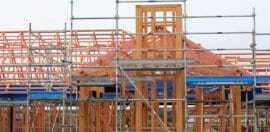Podcast project shows human cost of hotel program

Kelly Whitworth and Spike Chiappalone.
3 August 2022 at 9:10 pm
Centring the voices of homeless people, the podcast reveals their pandemic experience and raises the question of what could have been done better.
When COVID hit in 2020, people experiencing homelessness in Melbourne were rounded up off the streets and accommodated in hotels, ostensibly to help stop the spread of the virus.
Now, a new podcast series sheds light on what happened from the perspective of the city’s homeless community.
Homeless in Hotels was produced by Kelly Whitworth and Patrick ‘Spike’ Chiappalone, and features interviews and discussions with people experiencing homelessness – and those who work in the sector – about what those early days of the pandemic were like. Dr David Boarder Giles from Deakin University provided pre-production and interview assistance.
Almost all the interviewees in this this three-part audio series are experiencing homelessness themselves.
Whitworth and Chiappalone both have lived experience of homelessness and currently work in and around the sector, and it was important to them both to frame the project using the voices of those who experienced the Victorian government’s hotel accommodation program.
Noticing a lack of discussion and centring of their voices on the issue, the pair developed the idea for their podcast. They received funding from the Regina Brindle Foundation to bring their idea to life and used their networks to identify interviewees.
“It wasn’t announced”
Chiappalone feels strongly that there was injustice in the way homeless people and rough sleepers were treated during the pandemic hotel program.
He said the program was never directly announced to them, with people on the street instead hearing about it through word of mouth amongst the homeless community, or from outreach workers.
“People were confused. Different organisations were sharing different types of information,” he said.
That confusion is highlighted in the first episode of the podcast, with interviewees reliving the moments when they were told they would be accommodated in a hotel.
The ad hoc delivery of the information also made it difficult for members of the community to plan their days. At the same time, support services were cancelled due to COVID, leaving many in limbo and unable to manage their addictions and mental health.
Chiappalone said people experiencing homelessness felt hurt by the lack of communication or consultation they experienced.
Many experienced a further deterioration in their mental health.
Within the homeless community – just like any other aspect of society, Chiappalone said – there are people who don’t like to be situated near each other. Throwing everyone together in one place led to problems, he said.
Drug and alcohol abuse was rife in the hotels, as the podcast relates.
Many people in the hotels felt deflated and lost, with nothing to do. There was a sense that they were just being “managed”, Chiappalone said – the “undeserving poor”, put out of the way at a difficult time.
“They were really aware that this wasn’t to support them through a hard time. It was to actually protect the rest of the community. That was my sense. Because we’re not all in this together; that’s a lie,” he said.
The need for a “human rights-based housing policy”
Asked how the delivery of the hotel accommodation program could have been better managed, Chiappalone said he accepts the difficulty in communicating with Melbourne’s homeless and rough sleeper population – but that this stems from the lack of what he calls a “human rights-based housing policy”.
“This is where housing policy comes into it. When you don’t have a commitment to housing as a human right and housing is distributed through the free market, you’re left with only hotel ad hoc options,” he said.
Chiappalone feels strongly that Australia’s housing system is in dire need of a shake-up. Reflecting on the most recent census results, he said it’s a travesty that so many houses sit empty while people sleep on footpaths or couch surf.
“It’s not that the properties don’t exist, it’s the way they’re distributed,” he said.
“We wouldn’t have been left to just panic-manage people that are in crisis into these hotels where they had no control over where they were going or who they were going to live next to. When you don’t have a real housing policy and when you’re not actually committed to housing as a human right, that’s what you’re left with. That’s the problem.”
He said any new housing policy needs “input from the people” it affects the most.
“The most important thing is that whatever policy we have, it needs to be informed by the people that either have lived experience and are still close to it and are still interested in it, or are going through it right now.
“Because if you lock them out of the conversation… [the policy] doesn’t actually speak to the needs of the people.”
He believes that’s why Homeless in Hotels is so important – because it gives voice to those who were so drastically impacted by a single government policy.
After the emergency hotel accommodation program came to an end, the Victorian government launched From Homeless to a Home which aimed to provide 1845 house and support packages to people experiencing homelessness who had been housed in hotels during the pandemic.
Not everyone who is interviewed in the podcast has been lucky enough to find ongoing accommodation through that program, Chiappalone said.
“A couple are in supported accommodation. Another person got short-term [accommodation]. Some people did get apartment social housing. A couple are still homeless.”
Chiappalone hopes that the podcast helps to open people’s eyes to the reality of being homeless.
“I want people to know that people experiencing homelessness have hopes, dreams, and families. They want to get on just like everyone else. And that this whole stereotype of who homeless people are, that they’re ‘leaners’, is really offensive and really hurts people’s feelings.
“They have the same issues as everyone else, but their housing status is different.”







